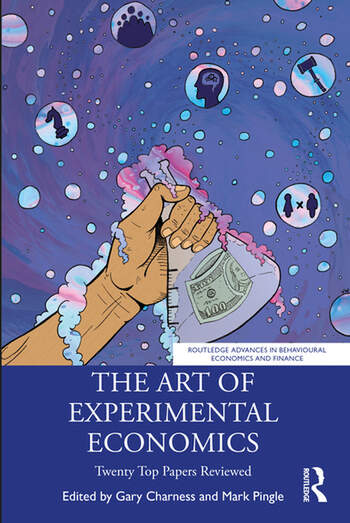Here's a forthcoming book that provides a unique and entertaining review of twenty influential papers in experimental economics. Katie Coffman and I wrote the review of the classic 2007 paper on gender and competition by Niederle and Vesterlund.
The Art of Experimental Economics: Twenty Top Papers Reviewed Edited By Gary Charness, Mark Pingle Forthcoming by Routledge
Item will ship after August 27, 2021 ISBN 9780367894306
Chapter 1: Introducing 20 Top Papers and their Reviewers Gary Charness and Mark Pingle
Chapter 2: An Experimental Study of Competitive Market Behavior (by Vernon L. Smith) Reviewed by Charles A. Holt
Chapter 3: The Strategy Method as an Instrument for the Exploration of Limited Rationality in Oligopoly Game Behavior (by Reinhard Selten) Reviewed by Claudia Keser and Hartmut Kliemt
Chapter 4: An Experimental Analysis of Ultimatum Bargaining (by Werner Güth, Rolf Schmittberger and Bernd Schwarze) Reviewed by Brit Grosskopf and Rosemarie Nagel
Chapter 5: The Winner’s Curse and Public Information in Common Value Auctions (by John H. Kagel and Dan Levin) Reviewed by Gary Charness
Chapter 6: Group Size Effects in Public Goods Provision: The Voluntary Contributions Mechanism (by R. Mark Isaac and James M. Walker) Reviewed by James Andreoni
Chapter 7: Rational Expectations and the Aggregation of Diverse Information in Laboratory Security Markets (by Charles R. Plott and Shyam Sunder) Reviewed by R. Mark Isaac
Chapter 8: Experimental Tests of the Endowment Effect and the Coase Theorem (by Daniel Kahneman, Jack L. Knetsch, Richard H. Thaler) Reviewed by John A. List
Chapter 9: Bargaining and Market Behavior in Jerusalem, Ljubljana, Pittsburgh and Tokyo: An Experimental Study (by Alvin E. Roth, Vesna Prasnikar, Masahiro Okuno-Fujiwara and Shmuel Zamir) Reviewed by Armin Falk
Chapter 10: Unraveling in Guessing Games: An Experimental Study (by Rosemarie Nagel) Reviewed by John H. Kagel and Antonio Penta
Chapter 11: Trust, Reciprocity, and Social History (by Joyce Berg, John Dickhaut, and Kevin McCabe) Reviewed by Vernon L. Smith
Chapter 12: Cooperation and Punishment in Public Goods Experiments (by Ernst Fehr and Simon Gachter) Reviewed by Yan Chen
Chapter 13: A Fine is a Price (by Uri Gneezy and Aldo Rustichini) Reviewed by Alex Imas
Chapter 14: Giving according to GARP: An Experimental Test of the Consistency of Preferences for Altruism (by James Andreoni and John Miller) Reviewed by Catherine Eckel
Chapter 15: Risk Aversion and Incentive Effects (by Charles Holt and Susan Laury) Reviewed by Kevin McCabe
Chapter 16: Does market experience eliminate market anomalies? (by John A. List) Reviewed by Matthias Sutter
Chapter 17: Promises and Partnership (by Gary Charness and Martin Dufwenberg) Reviewed by Urs Fischbacher and Franziska Föllmi-Heusi
Chapter 18: The Hidden Costs of Control (by Armin Falk and Michael Kosfeld) Reviewed by Laura Razzolini and Rachel Croson
Chapter 19: Do Women Shy Away from Competition? Do Men Compete Too Much? (by Muriel Niederle and Lise Vesterlund) Reviewed by Katherine B. Coffman and Alvin E. Roth
Chapter 20: Group Identity and Social Preferences (by Yan Chen and Sherry X. Li) Reviewed by Marie Claire Villeval
Chapter 21: Lies in Disguise—An Experimental Study on Cheating (by Urs Fischbacher and Franziska Föllmi-Heusi) Reviewed by Uri Gneezy and Marta Serra-Garcia
***************
Here's my Foreword to the book:
Twenty carefully chosen papers in experimental economics, reviewed and put in context by veteran experimenters, provide an excellent, close-up introduction to the richness and diversity of the field, and where it is coming from. These twenty papers appeared over a period of half a century, from 1962 to 2013, during which economic experiments went from being quite rare to taking their place among the standard tools of economics.
When John Kagel and I edited the Handbook of Experimental Economics, volumes 1 and 2 (1995 and 2016), we encouraged the chapter authors not to try to tell readers how to do good experiments, but to show them. And so it is with these papers: there are lots of ways to do good experiments, and here is a collection of twenty that have been influential. The reviews make clear that a successful, influential experiment is part of a scientific conversation that began well before the experiment was designed and conducted, and continued well after it was published and replicated. These conversations aren’t only among experimenters, nor are they only among economists: experiments add to scientific conversations of all sorts, answering some questions and raising others, often questions that couldn’t even be posed with equal precision in naturally occurring environments.
Reader, beware. After reading this volume, you will want to read more, and, your curiosity aroused, may find yourself on the slippery slope of designing and conducting your own experiments.
Alvin E. Roth, Stanford University, December 2020.
Bibliography:
Kagel, J.H. and A.E. Roth (editors) Handbook of Experimental Economics, Princeton University Press, 1995.
Kagel, J.H. and A.E. Roth (editors) Handbook of Experimental Economics, Volume 2, Princeton University Press, 2016.




No comments:
Post a Comment